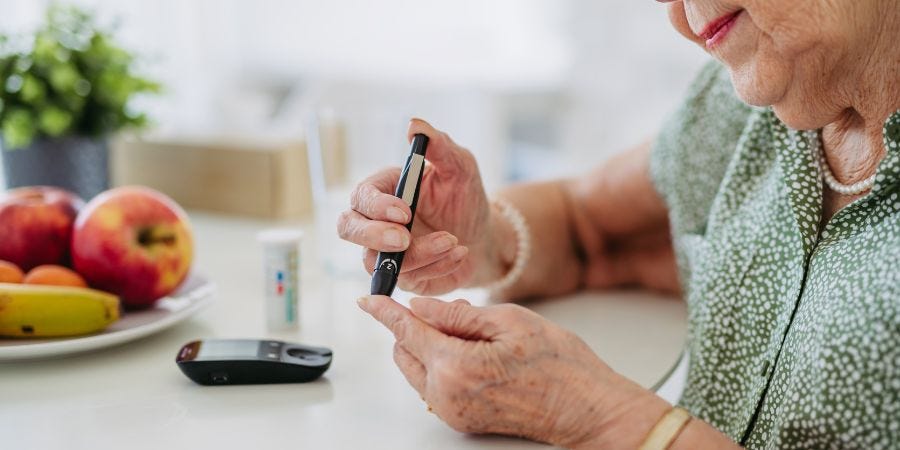Facing a diagnosis for diabetes mellitus can be a daunting experience, whether it’s for you, your child, or another loved one. The good news is there are plenty of people who can get you up to speed and ease your stress level. Building a supportive healthcare team should be a number one priority.
In This Article
Endocrinologist
While many people lean on their primary care provider for help managing diabetes, some prefer to enlist the help of a diabetes specialist or endocrinologist once they receive a diagnosis. You can ask for recommendations for an endocrinologist from your primary care and other healthcare providers, as well as trusted friends and family members. You can also search for an endocrinologist near you at the Hormone Health Network’s referral directory.
Sometimes it’s easier when your endocrinologist is in the same medical system as your primary care provider to make information sharing between them easier. But the main thing to consider is whether you feel this specialist will meet your needs, both in terms of diabetes management strategies and how well you communicate with each other.
Diabetes Educator
You may also be connected with a diabetes educator to help you achieve a successful transition to a new diabetic lifestyle. A Certified Diabetes Care and Education Specialist’s job is to help you manage your blood glucose levels effectively and avoid diabetes complications. He or she has extensive experience working with people with diabetes and can help you develop the skills and confidence you need to live well with the disease. These include things like how use your blood glucose meters, continuous glucose monitoring (CGM) devices, injectable insulin, and insulin pumps.
He or she can also help you analyze and understand your blood sugar readings and what impacts them. Over time, with the help of this team member, you can learn to identify patterns in your blood sugar levels in order to better predict how diet, physical activity, and other factors will affect them. The American Diabetes Association has provided an online database where you can search for a diabetes education program near you. In some cases, your diabetes educator will also be a registered dietitian (see next paragraph.)
Registered Dietitian Nutritionist
A registered dietitian nutritionist (RDN) may also be a valuable diabetes treatment team member, especially at the beginning. During this time you’ll learn healthy eating skills to keep your blood sugar levels in a safe range, avoiding high blood sugar (hyperglycemia) and low blood sugar (hypoglycemia). This team member can work with you on meal planning, counting carbohydrates, and how to substitute low-glycemic foods for high glycemic foods. They can also help set goals and develop plans to meet those goals through lifestyle changes. If your goals include weight loss, reducing cholesterol or blood pressure, a dietitian can help you get there.
Pharmacist
You may not think of your pharmacist as a part of your team, but this healthcare professional can play a valuable part in your diabetes care. Since you may be getting prescriptions called in by several different doctors, you’ll need a pharmacist to check for any potential interactions between them. Your pharmacist can also tell you more about any side effects that may be associated with your diabetes medications and if there are any foods or over-the-counter drugs you should avoid.
Podiatrist
A podiatrist specializes in treating problems in the lower legs and feet. Over time, high blood sugar can cause nerve damage known as diabetic neuropathy, most commonly affecting the lower extremities. People who smoke or have certain risk factors like obesity may be more likely to have nerve damage. People with this condition may have symptoms that develop gradually, like pain, tingling sensation, or numbness. Some people have trouble feeling the normal pain sensation when they get a cut or sore on their foot, and will not know to treat the site, which can lead to a serious infection. A podiatrist can help monitor your lower extremities for subtle signs of trouble and treat them quickly before they progress into serious complications.
Opthamologist or Optometrist
As with the lower extremities, having high blood sugar levels over a long period of time can cause damage to the eyes. Specifically, it can damage the small blood vessels in the retina, a condition called diabetic retinopathy. It can also put you at higher risk for glaucoma, cataracts, and diabetic macular edema. People with type 2 diabetes are encouraged to see an eye doctor right away in case they’ve had diabetes for a while without realizing it, and the health of their eyes may already be affected. People with type 1 diabetes should have an exam within 5 years of diagnosis. Yearly exams are recommended for both groups after the initial assessment.
Cardiologist
Because diabetics could be at higher risk for cardiovascular disease, you may be referred to a cardiologist. A cardiologist helps treat conditions like high cholesterol, high blood pressure and heart failure, stroke, heart attack, and others. It’s especially important to consult with a cardiologist if you have a history of heart disease in your family or already live with cardiovascular conditions.
Nephrologist
A nephrologist is a specialist who treats kidney disease. Over time, diabetes can damage the kidneys and they can’t filter blood properly. According to the National Institute of Diabetes and Digestive and Kidney Diseases, diabetes is the leading cause of kidney disease, and approximately 1 out of 3 adults with diabetes develops kidney disease. It can develop slowly over many years, but working with your healthcare team to keep your blood sugar within a safe range consistently can help. Your primary care provider can do the basic tests to assess your kidney health, but you may be referred to a nephrologist if problems are detected.
Family, Friends & Community
In addition to the physical toll of diabetes, receiving a diagnosis takes a toll on your mental health. It’s often helpful to lean on trusted family and friends to help manage the transition to your new lifestyle. You may want to choose one or two people who can go to doctor’s appointments with you, learn the signs and symptoms to watch for, encourage you to practice self care, and support you in an emergency.
You’ll find a wealth of online communities dedicated to living well with diabetes and prediabetes. The Diabetes Self-Management website offers help with everything from recipes, meal plans, achieving a healthy weight, as well as the latest news and research on diabetes. Diatribe, American Diabetes Association, and Centers for Disease Control and Prevention are all great educational resources. You’ll also find several support groups for diabetes on Facebook.
Information provided on the Aeroflow Healthcare blog is not intended as a substitute to medical advice or care. Aeroflow Healthcare recommends consulting a doctor if you are experiencing medical issues or concerns.






